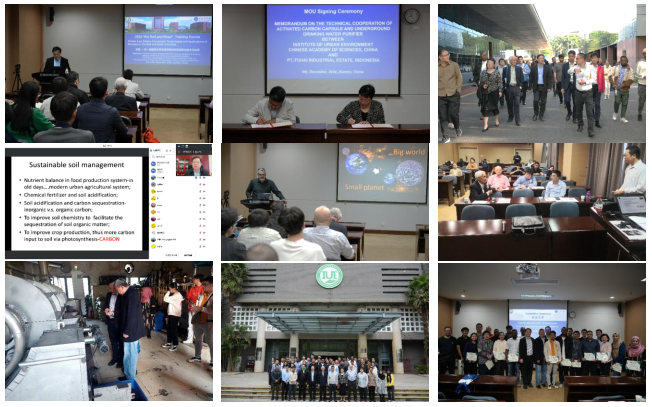From 8 December to 13 December, 2024, with the support of the International Cooperation Bureau of the Chinese Academy of Sciences (CAS), the “Training Course on Low Carbon Conversion Technologies and Applications of Biomass in ‘the Belt and Road’ Countries” jointly organized by the Institute of Urban Environment, Chinese Academy Sciences (IUE, CAS), the Alliance of National and International Science Organizations for the Belt and Road Regions (ANSO), the “Belt and Road” Alliance of Urban Environmental Health, was launched in Xiamen, China.
On 9 December, Prof. Yin Wang from IUE hosted the opening ceremony. Initially, Prof. Yuming Zheng, the Deputy Director of IUE, delivered an engaging speech to kick off the course. He warmly welcomed the experts and participants from various “Belt and Road” countries, including Malaysia, Indonesia, Thailand, Pakistan, the Philippines, Cambodia, Ethiopia, and China. and introduced the course's background and significance, as well as an overview of IUE's history and research domains. Subsequently, Prof. Yuming Zheng signed the Memorandum of Understanding (MOU) on behalf of IUE with PT. Fuhai Industrial Estate from Indonesia.
The invited experts including Academician Yong-Guan Zhu, the Director-General of the Research Center for Eco-Environmental Sciences of CAS, Prof. Franz Gatzweiler of IUE, Associate Profe. Qingyang Lyu of the Chengdu Institute of Biology, CAS, Dr Daniel Tan Lee Tung of Swinburne University of Technology of Malaysia, Prof. Yin Wang and Dr. Jie Li of IUE, Associate Prof. Xiaoxin Li of the Center for Agricultural Resources Research, Institute of Genetics and Developmental Biology, CAS, Associate Prof. Xiaoyan Zou of IUE, Prof. Min Qiao of the Research Center for Eco-Environmental Sciences of CAS, Associate Prof. Jun Meng of Zhejiang University of Science & Technology and Prof. Zubin Xie of the State Key Laboratory of Soil and Sustainable Agriculture of the Institute of Soil Science of CAS, gave lectures to about 300 participants online and offline, respectively. The topics contained waste management and soil health in sustainable urbanization, new systems science approach to Urban Health and Wellbeing, technology and practice of livestock and poultry manure composting, potential of biomass utilisation from forestry and agricultural sectors for high-value products in Sarawak, Malaysia, coproduction of carbon, heat and power by pyrolysis gasification of biomass wastes, farmland nutrient management theory and practices, soil plastic mulch pollution and preventive measures based on functional microorganisms and biochar, transmission and diffusion mechanisms of antibiotic resistance genes in soil ecosystems and risk management, preparation of biochar and its application in agriculture and environment, and principles and solutions to sequester carbon and decrease greenhouse gases emissions in farmland of China.
To enhance the participants' comprehension of waste biomass recycling, they visited Damin Foodstuff (ZHANGZHOU) Co., Ltd. on December 9th to observe the production of thermal and electrical energy from waste tea dregs and coffee residues, among other waste biomass materials. On December 11th, they toured Joypure Water Purification Tech. Co., Ltd. to learn about the manufacturing process of carbon-based filters. Finally, on December 12th, they examined pilot-scale pyrolysis equipment for waste biomass at IUE. The participants have listened attentively and engaged in discussions with great enthusiasm. They have conveyed that the course content aligns closely with the practical needs of their respective countries and have expressed a strong desire for collaboration. They have expressed their hope that the Chinese delegation will reciprocate with a visit at the earliest convenience for further in-depth communication and to establish substantive cooperation promptly.
At the conclusion of the course, Prof. Yin Wang summarised the training course and awarded certificate of completion to the participants. The training course on “Low Carbon Conversion Technologies and Applications of Biomass in ‘the Belt and Road’ Countries” provided a scientific basis and Chinese solutions for the low carbon utilization of biomass resources in the Southeast Asian region. It will contribute to solving the key issues of people’s well-being in countries and regions along the “Belt and Road”.

Contributor: Yin Wang, Institute of Urban Environment, Chinese Academy of Sciences
E-mail: yinwang@iue.ac.cn